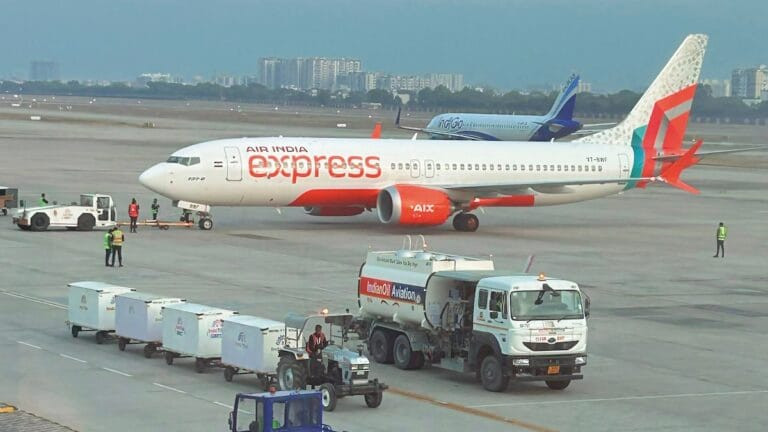- EASP AIR BV and Ostend-Bruges Airport plan a 4,900+ m² hangar and office complex on Apron 2, replacing outdated facilities.
- The development features two hangars with three-story office towers, forming the operational base for EASP AIR’s Special Mission Expertise Centre.
- The centre will support specialised aviation missions, including coast guard operations, aerial firefighting, and disaster response across Europe and the North Sea.
- Facilities will house DO328 Maritime Patrol Aircraft, larger jets like the Bombardier Global 7500, and provide maintenance for business and regional military aircraft with JetSupport.
India’s express logistics industry has shifted from the margins of supply chains to the centre of debates on trade competitiveness, air cargo capacity, and sustainability. A new report, Powering India’s Economy, Connecting Businesses and Markets, by the Express Industry Council of India (EICI) and KPMG in India, highlights this transformation. The sector grew from US$3 billion in FY17 to US$9 billion in FY25 and is projected to reach US$18–22 billion by FY30.
For global air cargo, the findings suggest India’s express sector could reshape cross-border flows of time-sensitive goods, positioning the country as both a manufacturing base and a potential transshipment hub between Asia, Europe, and Africa.
From supporting role to economic pillar
The report shows the sector is now an essential pillar of India’s economy. By FY25, it supports 2.8–3 million jobs, contributes US$1–1.5 billion in GST revenues, and US$650 million in Customs revenues. By FY30, employment could double to 6.5–7.5 million.
Vijay Kumar, CEO of EICI, said: “The express industry has become a critical pillar of India’s economy, connecting businesses and markets with speed and reliability. From supporting the vaccination drive during the pandemic to enabling e-commerce and exports, our sector has shown agility, resilience and innovation.”
For air cargo professionals, these figures point to rising demand for uplift capacity, express handling facilities at airports, and stronger alignment with customs and border authorities.
Domestic dominance, international expansion
Domestic express currently makes up 70 percent of the market (US$6.3–6.5 billion), much of it surface-led due to India’s geography and improved road networks under Bharatmala Pariyojana.
International express, with 30 percent market share, is expanding faster. In FY24 it handled 19.5 million shipments weighing 152,300 tonnes, growing 18 percent annually between FY21 and FY24. Demand is fuelled by “Made-in-India” exports—auto components, textiles, home furnishings, electronics—often requiring time-definite delivery. For air freight operators, this means greater use of long-haul corridors to Europe and North America, and new opportunities to consolidate India’s role as a regional hub.
Policy and infrastructure priorities
India’s logistics costs are about 14 percent of GDP, versus 8–10 percent in developed economies, constraining competitiveness. The National Logistics Policy (NLP) and PM Gati Shakti aim to reduce this through digitalisation, multimodal integration, and infrastructure upgrades.
For air cargo, two priorities stand out:
Border efficiency – Express logistics is highly sensitive to customs delays. Digital, predictable clearance—pre-arrival processing, harmonised risk management, and 24/7 border operations—will be key if India is to capture flows now routed via Dubai, Singapore, or Hong Kong.
Hub ambition – With new airports like Navi Mumbai and expansions at Bengaluru and Delhi, India could become a regional transshipment hub. But this requires bonded trucking reforms, uniform transshipment rules, and competitive freighter slot allocation.
Girish Nair, Partner at KPMG in India, said: “Enhancing efficiency through digitisation and automation, while exploring strategic growth opportunities such as positioning India as a transshipment hub, will further advance the sector.”
Technology and sustainability pressures
Technology adoption is reshaping express logistics. Operators are deploying blockchain for visibility, AI for demand planning, and automation for handling. These efforts align with global digitalisation drives such as IATA’s One Record and e-AWB.
Sustainability is a tougher challenge. Aviation accounts for 2.5 percent of global CO₂ emissions, with freight disproportionately high. Express players are adopting electric fleets for first- and last-mile delivery, but long-haul air cargo depends on sustainable aviation fuels (SAF) and fleet renewal.
Chintan Patel, Partner at KPMG, noted: “With consolidation driving efficiency, technology setting new benchmarks, and multi-modal infrastructure paving the way for sustainable delivery, the sector is redefining speed, reliability and scale.”
The report calls for a “sustainable operating outlook,” reflecting regulatory and market pressures. Multinationals and global e-commerce platforms increasingly embed emissions targets in procurement. With cross-border e-commerce expected to grow over 15 percent annually through 2030 (WorldACD), sustainability metrics will shape competitiveness.




